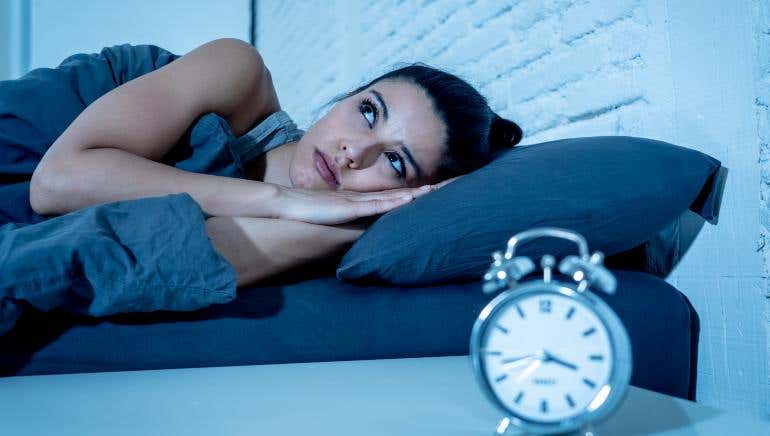Sleep loss does a lot more than just make us tired, study finds
Research suggests that sleep loss can have a profound impact on our emotional well-being, potentially diminishing our positive moods

[Dec. 25, 2023: JD Shavit, The Brighter Side of News]
This eye-opening research, led by Dr. Cara Palmer of Montana State University, synthesizes over five decades of studies on sleep deprivation and its effects on mood. (CREDIT: Creative Commons)
In our fast-paced world, where schedules often leave us burning the midnight oil or robbing us of a few precious hours of sleep, it's no secret that sleep loss can make us feel tired and groggy.
However, a recent study published by the American Psychological Association (APA) reveals a deeper and more concerning aspect of sleep deprivation. It suggests that sleep loss can have a profound impact on our emotional well-being, potentially diminishing our positive moods and increasing the risk of anxiety symptoms.
This eye-opening research, led by Dr. Cara Palmer of Montana State University, synthesizes over five decades of studies on sleep deprivation and its effects on mood.
Dr. Palmer, who spearheaded this comprehensive analysis, emphasizes the significance of understanding the consequences of sleep loss in our sleep-deprived society.
She states, "In our largely sleep-deprived society, quantifying the effects of sleep loss on emotion is critical for promoting psychological health." This study represents the most extensive synthesis of experimental sleep and emotion research to date, shedding light on how periods of extended wakefulness, shortened sleep duration, and nighttime awakenings can detrimentally influence our emotional functioning.
Related Stories
The findings of this groundbreaking study were published in the prestigious journal Psychological Bulletin, reflecting its importance in the field of psychology and sleep research.
To unravel the intricate relationship between sleep and emotions, Dr. Palmer and her colleagues, including co-lead author Dr. Joanne Bower of East Anglia University, meticulously analyzed data from a staggering 154 studies spanning five decades.
This comprehensive examination encompassed a total of 5,715 participants who willingly subjected themselves to sleep disruption for the sake of science. In these studies, participants endured various forms of sleep manipulation. Some were deprived of sleep for extended periods, while others received less sleep than they typically would.
Each bar represents the percentage of studies with (from left to right) high (red), low (orange), or unclear (grey) risk of bias for each category. (CREDIT: Psychological Bulletin)
Still, others experienced periodic awakenings throughout the night. After each of these sleep experiments, researchers measured various emotion-related variables, including self-reported mood, responses to emotional stimuli, and indicators of depression and anxiety symptoms.
The results of this extensive analysis were striking. Across all three types of sleep loss scenarios, participants reported experiencing fewer positive emotions, such as joy, happiness, and contentment. Additionally, anxiety symptoms were on the rise, manifesting as a rapid heart rate and heightened worrying. Dr. Palmer highlights, "This occurred even after short periods of sleep loss, like staying up an hour or two later than usual or after losing just a few hours of sleep." In essence, even minor deviations from our regular sleep routines can have a significant impact on our emotional well-being.
The size of each bubble corresponds with the study sample size. The teal color represents a linear function; the purple color represents a quadratic function. The shaded area represents the 95% confidence interval. The anxiety model excludes an outlier. (CREDIT: Psychological Bulletin)
Furthermore, sleep loss was found to dull our emotional responsiveness, reducing our ability to react to emotional stimuli effectively.
The link between sleep deprivation and symptoms of depression, on the other hand, proved to be less robust and consistent. Similarly, the effects of sleep loss on negative emotions such as sadness, worry, and stress were less pronounced.
Effect of REM Sleep Loss ( vs. SWS Loss) on Negative Valence in Response to Emotional Stimuli. (CREDIT: Psychological Bulletin)
While these findings provide valuable insights into the connection between sleep and emotions, it's essential to acknowledge a limitation of the study: the majority of participants were young adults, with an average age of 23. Future research should strive for a more diverse age sample to better understand how sleep deprivation affects individuals at different stages of life.
Additionally, researchers suggest investigating the effects of multiple consecutive nights of sleep loss, exploring individual differences that might make some people more susceptible to the effects of sleep deprivation, and examining how sleep loss impacts people in various cultural contexts. The majority of research included in the current study was conducted in the United States and Europe, which may not fully capture the global perspective.
Dr. Palmer underscores the significance of these findings in the context of modern society. "Research has found that more than 30 percent of adults and up to 90 percent of teens don't get enough sleep," she states. This staggering prevalence of sleep deprivation highlights the profound implications of this research for both individual and public health.
In a society where many are grappling with insufficient sleep, it's crucial for industries and sectors that are prone to sleep loss, such as first responders, pilots, and truck drivers, to develop and adopt policies prioritizing sleep. These measures could help mitigate the risks associated with sleep deprivation and safeguard daytime function and overall well-being.
This research highlights the urgent need for policy changes and a greater societal commitment to improving sleep quality, ultimately fostering a more emotionally resilient and healthier population.
Note: Materials provided above by The Brighter Side of News. Content may be edited for style and length.
Like these kind of feel good stories? Get the Brighter Side of News' newsletter.



